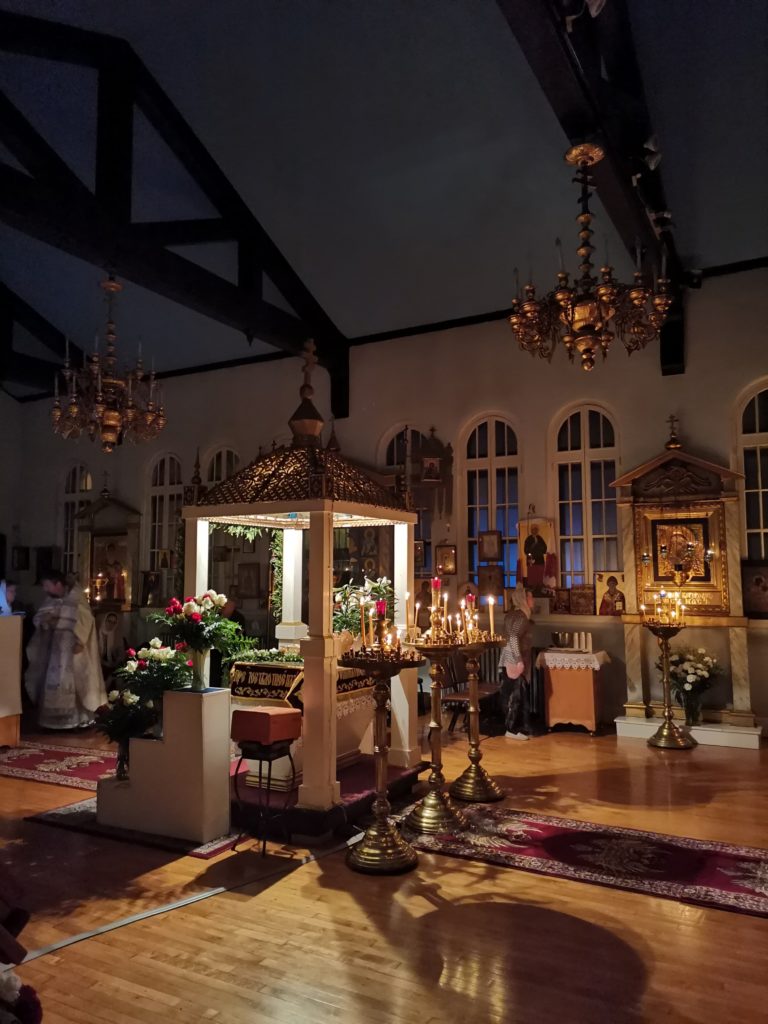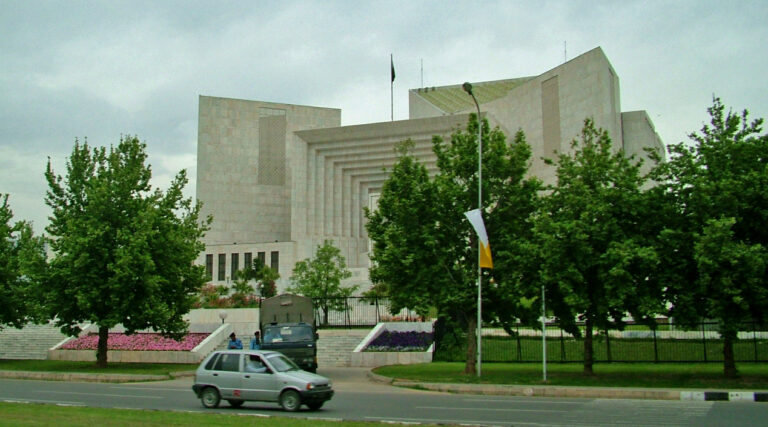
Dissenting Voices: Unveiling Complexity in the Russian Orthodox Church’s Stance on the Ukraine Conflict
Evgeniia Muzychenko
Picture of a dome at the Cathedral of Peter and Paul, Petergof, Russia. Taken by Author.
Expressing the position of the Russian Orthodox Church (ROC) regarding the conflict in Ukraine, the media predominantly concentrates on the stance articulated by Patriarch Kirill, a longtime ally of Russian president Vladimir Putin. In his capacity as the head of the Russian Orthodox Church, Kirill is viewed as representing the official standpoint of the ROC as an institution. However, to assume unanimous alignment between the entire Russian Orthodox community and the patriarch’s perspective oversimplifies an intricate reality.
Historically, the patriarch in the Russian Orthodox Church held a significant position as the highest-ranking bishop and spiritual leader, with authority over the church’s administration and clergy. Patriarch Kirill, currently serving in this role, is responsible for guiding the church’s direction, maintaining doctrinal orthodoxy, and engaging in matters of public and social importance, playing a crucial role in the religious, cultural, and, in the case of Kirill, the political landscape of Russia. While the patriarch holds a role of a spiritual and even social authority for the Russian Orthodox community, the believers are not equivocal in accepting Kirill’s leadership.
Numerous Russian Orthodox communities, both within and outside Russia, dissent from Putin’s regime and vehemently condemn the ongoing conflict. Acknowledging the divergent viewpoints within the Russian Orthodox community contributes to a more nuanced understanding of the church’s position on matters related to the war. An essential step toward dispelling the oversimplified portrayals of the ROC’s stance involves recognizing that the church encompasses not only its authorities but also ordinary believers, many of whom hold contrasting views from those espoused by Kirill and Putin.
As a Russian Orthodox woman who has spent the majority of her life in Russia and is embarking on a scholarly journey in the field of religion, I feel compelled to express my disagreement with the official position of the ROC. I am writing this opinion piece in the hope that my knowledge and experiences can contribute to broadening public awareness of the diverse perspectives within the Russian Orthodox Church concerning the ongoing war.
It is with a heavy heart that, as a Russian Orthodox individual, I witness the leader of my church blessing the violence inflicted by Putin in Ukraine. The realization that, particularly in the initial months of the war, Western media ensured the global community perceived the Russian Orthodox Church as an advocate of Putin’s politics is profoundly distressing. Ultimately, the term “church” encompasses not only the patriarch but also the voices of ordinary believers, whose perspectives are seldom heard in the public discourse.
Concentrating solely on the perspectives of specific individuals, whether they are political leaders or religious authorities, entails the risk of generating partial and biased narratives. The historiography has at times been culpable of oversimplifying people, occurrences, and viewpoints, and this tendency is frequently mirrored in media representations.
Since the commencement of the conflict in Ukraine, media outlets have proliferated with headlines such as “The Russian Orthodox Church Supports War.” However, a closer examination reveals that the content of these articles predominantly pertains to Patriarch Kirill endorsing the conflict. It prompts one to ponder how many readers, amidst the ubiquity of such headlines, pause to reflect on whether these articles address the entire ecclesiastical body, encompassing the broader community of believers, or if the Russian Orthodox Church is being synonymous solely with Patriarch Kirill.
Historical documentation must diligently consider all available facts, yet the recounting of history transcends mere data compilation. It unfolds as a narrative of the past, delivered by a storyteller – a historian – to the present. The narratives themselves undergo transformation based on the perspectives of those who wield the pen. The storytellers bear the agency to illuminate certain facts while obscuring or even misrepresenting others.
Regrettably, the lived experiences of ordinary individuals often suffer the lamentable fate of being silenced. Particularly in the realm of religious history, the selectivity of accounts is evident, with discussions of the “church” primarily focusing on ecclesiastical authorities or individual decision-makers in religious matters. The religious experiences of common believers, pivotal for a comprehensive understanding of history, receive markedly less detailed attention.
In my capacity as one of these common believers, I endeavor to convey narratives that merit attention from the broader public. At the age of 27, having spent the majority of my life in Russia before leaving for the United States to pursue my master’s and Ph.D. programs, my identity as an Eastern Orthodox has been a defining aspect of my life. Active participation in church life brought me profound joy, offering solace during life’s most challenging moments. Rooted in the Eastern Orthodox tradition, the emphasis on spiritual resilience, mirroring the example set by Christ, constitutes a shared cultural trait among the people of Russia.
Moving to the U.S. prompted a profound exploration of my religious identity. I discovered that I could not seamlessly integrate into any Eastern Orthodox church; it had to be a Russian Orthodox Church where I felt a genuine sense of belonging. This connection extended beyond familiar interiors and hymns sung in Church Slavonic; praying with a community that shared my cultural background held deep and meaningful significance. Recapturing the familiar prayer practices from my time in Russia proved immensely grounding, aiding in coping with the challenges of living abroad. It was outside of Russia that the term “Russian Orthodox” crystallized as an apt descriptor for my faith and religious self-understanding.

As the significance of my religious belonging intensified in the midst of being far from home, the unwelcome and deeply lamentable war in Ukraine unfolded. The revelation that Patriarch Kirill endorsed the war was profoundly distressing to me. Kirill, as the head of the Russian Orthodox Church, to which I felt a profound connection, especially in my life abroad, left me conflicted.
I grappled with disappointment in myself for harboring hope that, as a Christian and religious leader, Kirill might condemn the violence of the war. Yet, the harsh reality was that such hopes were futile, given the publicly available fact of the Patriarch’s alignment with Putin. It led me to reflect on whether there had ever been a historical instance in Russia when church leaders did not align with secular authorities.
I recognized that Patriarch Kirill’s leadership did not necessarily encapsulate the perspectives of the entire Russian Orthodox community. Furthermore, the patriarch’s viewpoints held no sway over my own convictions—I had long been an opponent of Putin’s politics, and I adamantly rejected any endorsement of the violence perpetrated by Putin in Ukraine. Being a Russian Orthodox adherent constitutes a significant facet of my identity, encompassing both my faith and cherished cultural ties, particularly poignant now as I find myself geographically distant from my homeland. However, the realization dawned that were I to attend my church in Russia at present, I would not be reciting the concluding prayer that traditionally includes supplication for the local church head, the eparchy’s leader, and the head of the ROC—namely, Kirill.
Across centuries, communities of believers have diverged from the positions of their authorities, dissenting from church leaders without forfeiting their affiliation with the church. My adherence to Russian Orthodoxy does not imply endorsement of the war. I firmly believe that aligning with violence and bloodshed contradicts Christian principles. Dissent with the Patriarch does not diminish my Orthodox identity, as Orthodoxy inherently rejects support for war or violence. Critically, condemning Putin’s regime does not diminish my Russianness, recognizing that the policies in Ukraine orchestrated by Putin do not represent the entirety of the Russian populace.
It is noteworthy that the stance adopted by the leadership of the Moscow Patriarchate concerning the conflict in Ukraine not only conflicts with the fundamental tenets of the Christian faith but also runs counter to its own official doctrinal texts. The Principles of the Social Concept of the Russian Orthodox Church (formulated with the direct involvement of the current Patriarch during his term as Metropolitan) explicitly articulate that activities in which clergy and canonical church structures are prohibited from engaging or collaborating with the state encompass “conducting a civil war or an aggressive external war” (III. 8.). This language explicitly forbids the Church from endorsing the conflict. Observing Patriarch Kirill negating his own propositions prompts contemplation on the significance of my affiliation with a church that appears to support violence and engage in self-compromise.
It is important to recognize that not all authorities within the Russian Orthodox Church (ROC) are in opposition to this doctrine. The leadership of the Russian Orthodox Church Outside Russia (ROCOR), which re-established canonical ties with the ROC in 2007 following an 80-year hiatus, expresses dissent regarding the ongoing conflict.
Bishop Irenei of London and Western Europe, a hierarch of the Russian Orthodox Church Outside of Russia, has explicitly lamented the war in Ukraine and advocated for its cessation. His statement has been disseminated through the diocese’s official website.
In an editorial letter, Serafim Gan, the Chancellor of the Synod of Bishops and Secretary to the First-Hierarch of the ROCOR, underscores that ROCOR has no affiliation with Kremlin’s propaganda and categorically does not endorse the conflict in Ukraine. Gan further critiques journalists who inaccurately accused Bishop Irenei of promoting support for the war. Paying heed to the perspectives of these church leaders is imperative for rectifying the narrow portrayal of the Russian Orthodox Church, which tends to equate Patriarch Kirill with the entirety of the church.
With all this said, I believe that it is pertinent to account for the complex variety of perspectives within the Russian Orthodox Church (ROC) regarding the conflict in Ukraine. To reveal a multifaceted reality that transcends the singular portrayals of the ROC in the media necessitates adopting a more expansive perspective on the identity of the Russian Orthodox Church. While Patriarch Kirill’s alignment with Putin draws significant attention, it is crucial to acknowledge dissenting voices within the ROC, particularly from communities both within and outside Russia.
It is pivotal to underscore a doctrinal contradiction to the stance the Patriarch adopts in the war. The divergence of views within the ROC, exemplified by leaders of ROCOR, sheds light on the importance of considering diverse perspectives. As a Russian Orthodox woman and a scholar of religion, my commitment to expressing dissent stems from a desire to contribute to a more comprehensive understanding of the church’s varied positions on the ongoing war. Ultimately, the portrayal of the ROC should extend beyond its leadership, recognizing the voices of ordinary believers and challenging oversimplified narratives that equate the entire church with the perspectives of a single figure.♦

Evgeniia Muzychenko (she/her) is a doctoral student in the Historical Studies in Theology and Religion (GDR) at Emory University. Evgeniia focuses on the history of Evangelical missions in Western India. Evgeniia’s main research interests center around the history of Christianity, missiology, interfaith dialogue, and conversion. Evgeniia received her BA in Asian and African Studies at Saint Petersburg State University (Russia) in 2019. As a Fulbright scholar, Evgeniia completed a Master’s program in Theological Studies at Villanova University (Pennsylvania) in 2022.
Recommended Citation
Muzychenko, Evgeniia. “Dissenting Voices: Unveiling Complexity in the Russian Orthodox Church’s Stance on the Ukraine Conflict.” Canopy Forum, January 19, 2024. https://canopyforum.org/2024/01/19/dissenting-voices-unveiling-complexity-in-the-russian-orthodox-churchs-stance-on-the-ukraine-conflict/.





